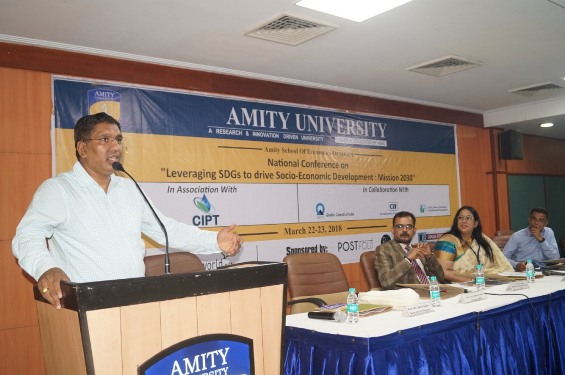22 Mar 2018|Noida | F1 Seminar Hall
Inauguration of National Conference on “Leveraging Sustainable Development Goals (SDGs) to Drive Socio-Economic Development: Mission 2030"

Amity Schoolof Economics (ASE) in association with Center for International Projects Trust(CIPT) started National Conference on “Leveraging Sustainable Development Goals(SDGs) to Drive Socio-Economic Development: Mission 2030" at AmityUniversity Sector 125 Noida.
The aim of thetwo day conference is to spread awareness about the various SDGs and theirusefulness towards India’s socio-economic development in general and the Stateof Uttar Pradesh in particular by providing a platform to professionals,academicians and researchers to share their research and intellectualexpertise.
The nationalconference has received more than 150 research papers across the Nation, out ofwhich 138 papers are shortlisted for presentation.
Welcoming thegathering, Prof. (Dr.) Shalini Singh Sharma, Director, ASE said that theconference is organized to encourage and motivate the young research scholarsto understand the intricacies of SDGs. She expressed her hope thatdeliberations during the conference will lead to suggestions for EconomicPolicy initiatives specifically for the state of Uttar Pradesh to achieveMission 2030.
Inaugurating theconference, Prof. (Dr.) R. P. Singh, Secretary General, Quality council ofIndia said that youth are the change makers of society since their mind isnot yet corrupted by the system. He averred that India’s projected GDP growthrate is at 7.3% in 2018 while China’s at 6.8% but stressed that despite fastereconomic growth, we are still behind since China’s economy is six times thanIndia so their growth is still better. He pointed out that Indian market isflooded with Chinese products which has badly affected various Indianindustries like Textile, Toys, Electronics etc. Dr. Singh mentioned that everycountry protects its interests through regulations but India has tremendousdeficit of regulations. He suggested that students should research on howstandards and technical regulations are affecting trade and sustainable growth.
Addressing thegathering, Prof.( Dr.) Kamal Vatta, Director, Centre for InternationalProjects Trust said that elasticity of employment is very low since inIndia, 8% growth of GDP can lead only to 2% growth in employment. He mentionedthat there are four important avenues for job creation such as accelerating thegrowth of economy, emphasis on labour intensive avenues, improving thefunctioning of labour markets and development of skill and knowledge. Apprisingabout hiring norms by employees, Dr. Vatta said that as per a survey, it wasobserved that 19% of employers require domain expertise, 15% look forintegrity and values, 14% seek good communication skills , 13 % decide on thebasis of learning agility, 10% see numerical and logical ability, 9% resultorientation and so on. He pointed out that it is important to inculcatestudents with integrated skills and values.
Sharing hisviews, Mr. Sachin Joshi- Executive Director, CII-ITC Centre of Excellencefor Sustainable Development shared that SDGs are an outcome of a sharedvision of global community with expectation from young people as a drivingforce to support development and contribute towards peace and security. Heapprised that SDGs are not only meant for poor but also for rich since they arethe maximum resource consumer and with constant increase in resource guzzlingcapacity by limited section of population will make the world move towardsunsustainable growth. Mr. Joshi stressed that growth doesn’t necessarily meansdevelopment. He further added that India is having an economic growth which isalso not creating jobs, thereby leading towards inequality andunsustainability. He called upon the budding leaders to challenge the systemand change the society since they have better understanding of their futureneeds.
During the twoday national conference, various technical sessions and panel discussions wouldbe conducted to deliberate upon several pertinent topics including “AgricultureEnvironment and Livelihood Sustainability”, “Entrepreneurship and CSR”,“Inclusive Growth”, “Innovative Management Practices for SustainableDevelopment”, “Environment And Related Issues: Achieving the emission goals by2030” and “Skill Development and Human Capital” amongst others.